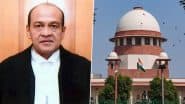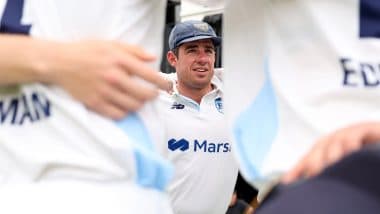Canberra, Aug 15 (AP) An Australian court will announce its verdict next week on the appeal of the most senior Catholic clergyman to be found guilty of child sex abuse.
Cardinal George Pell could walk free if the judges acquit him of the five convictions for molesting two choirboys in a cathedral more than two decades ago. They also could order a retrial, in which case Pell would be released on bail, or they could reject his appeal.
No matter the verdict by the Victoria state Court of Appeal, Pell's case is likely to end up in the High Court, Australia's final arbiter.
Pell, 78, has been in a Melbourne prison since March when he was sentenced to six years for convictions on charges that he orally raped a 13-year-old choirboy and also indecently dealt with the boy and the boy's 13-year-old friend in a rear room of St. Patrick's Cathedral in Melbourne in December 1996.
He was also convicted of squeezing one of the boy's genitals in a cathedral corridor in February 1997.
The appeals court heard his arguments against the five convictions in early June, and the three judges announced on Thursday they will give their verdict next Wednesday.
Pell had become archbishop of Melbourne, Australia's second-largest city, months before his crimes are alleged to have taken place and had set up a world-first compensation arrangement for victims of clergy sexual abuse.
He has been until recently Pope Francis' finance minister, described at his trial as the Vatican's third most senior cleric.
Pell's lawyers had to prove to the appeals court that the jury of eight men and four women that unanimously convicted him in December must have held a reasonable doubt about his guilt.
An earlier trial had ended in a deadlocked jury. An 11-to-1 majority decision to either convict or acquit could have been accepted, but at least two jurors held out.
"The verdicts represent a disturbing failure of our jury system," Pell's lawyers said in written submission to the appeal court.
"It is accepted that juries can and do, at times, render perverse verdicts which are unsupported by the evidence as a whole and are thus contrary to law," they added.
Prosecutors replied that the evidence of more than 20 priests, choristers, altar servers and church officials showed there were "possible hindrances" to the prosecution case, but did not preclude the jury from being satisfied beyond a reasonable doubt of Pell's guilt.
Pell's lawyers argue the events in 1996 as described in the prosecution case were "improbable and even impossible" to have happened quickly and in part of the cathedral where altar servers and priests were likely to walk in at any moment.
One of the choirboys, identified by the sentencing judge as JJ, was the key prosecution witness. His friend, identified as MR, died of a heroin overdose in 2014 at the age of 31 without ever complaining he had been abused.
Pell was also convicted on an allegation that he grabbed JJ by the genitals and shoved him against a wall in a cathedral corridor shortly after Mass in 1997. Pell's lawyer wrote in a submission to the court that the allegation was "implausible."
Prosecutor Chris Boyce described the complainant as a "very compelling witness." "He was clearly not a liar. He was not a fantasist. He was a witness of truth," Boyce told the appeals court.
Pell did not testify at either of his trials.
But both juries saw his reactions to the allegations when they were put to him by police in a video record of interview in Rome in 2016. Pell rejected the allegations as "absolutely disgraceful rubbish" and a "deranged falsehood."
Francis' papacy has been thrown into turmoil by clerical sexual abuse and the church's handling of such cases. In a little more than a year, the pope has acknowledged he made "grave errors" in Chile's worst cover-up, Pell was convicted of abuse, a French cardinal was convicted of failing to report a pedophile, and a third cardinal, former US church leader Theodore McCarrick, was defrocked after a Vatican investigation determined he molested children and adults.
The Catholic Church in Australia has been under sustained scrutiny.
Former Adelaide Archbishop Philip Wilson in 2018 became the most senior Catholic convicted of concealing child sex abuse. That was before French Cardinal Philippe Barbarin was given a six-month suspended sentence by a Lyon court on a similar conviction in March this year.
But a New South Wales state appeal court in December overturned Wilson's conviction after he had served almost four months of a yearlong home detention sentence.
In a decision that might give Pell hope, the prosecution in Wilson's case decided against appealing to a higher court. (AP)
(This is an unedited and auto-generated story from Syndicated News feed, LatestLY Staff may not have modified or edited the content body)













 Quickly
Quickly




















